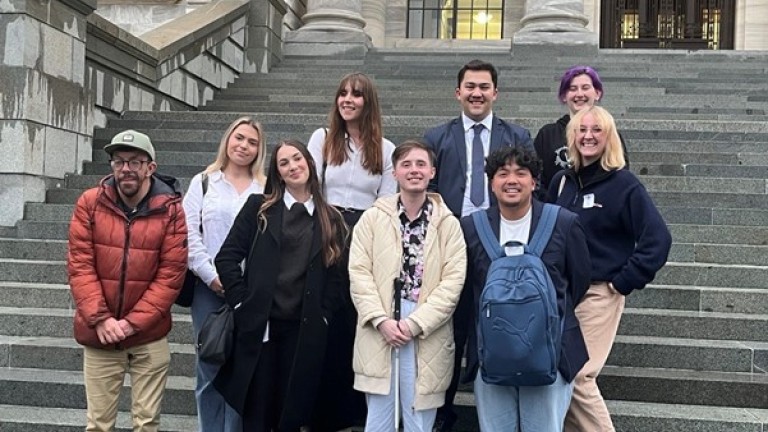A group of young people visited the Beehive earlier this month to share their insights about mental health and wellbeing with Ministers from the Child and Youth Wellbeing Ministerial Group.
Most of the young people came from youth advisory groups (including VOYCE Whakarongo Mai, Whāraurau, Yes Disability and Youthline) who had contributed to a recent Te Hiringa Mahara (Mental Health and Wellbeing Commission) report: Young people speaking about Wellbeing: An insights report into the Wellbeing of Rangatahi Māori and other Young People in Aotearoa.
The Te Hiringa Mahara report focuses on rangatahi Māori and other young people’s mental wellbeing, which is a priority area of focus under the Child and Youth Wellbeing Strategy (the Strategy). Mental wellbeing is an area that young people have consistently identified as fundamental to their wellbeing now and in the future. The most recent New Zealand Health Survey results show a statistically significant increase in psychological distress among young people aged 15-24 years between 2019/20 and 2020/21.
The Strategy also identifies the need for rangatahi Māori and other young people to be able to speak for themselves about their experiences and share insights in a safe space with dignity and respect. Enabling young people to engage directly with Ministers is one way government is upholding this intent.
Young people spoke with Ministers about:
- the difficulty in accessing youth-friendly mental health services either for themselves or for other young people needing help due to limited availability, cost pressures, tick boxes and the large amounts of paperwork required before support could be accessed. Meanwhile, they said, young people were continuing to suffer.
- the issues faced by young disabled people in a system that does not recognise the needs of those who have a disability and need mental health support as well.
- the experiences of young people with hidden disabilities and the need to understand and support them better.
- the need for better support for young people and caregivers in the Oranga Tamariki care and protection system.
Young people called for:
- counselling to be made available (via trauma-trained counsellors) at no cost for every child or young person under the care of Oranga Tamariki
- training in trauma-informed practice so that frontline services and caregivers are able to support young people who have experienced trauma
- wrap-around support for rangatahi Māori who move to urban centres like Wellington
- Co-Response Teams (Police, Ambulance and mental health workers) to become standard practice in supporting young people in crisis
- more public promotion of the mental health supports that are available to young people, especially disabled youth, and improved visibility of disabled youth in this promotion
- a sustainable approach to including and actioning youth voice and leadership in decision-making, including continuous feedback loops
- youth lived experience roles to be embedded within Manatū Hauora (Ministry of Health), Te Whatu Ora (Health NZ), Te Aka Whai Ora (Māori Health Authority) and other relevant government agencies.
The insights will contribute to:
- ongoing work by Manatū Hauora as the lead agency for the cross-government focus on ‘enhancing the mental wellbeing of children and young people’ priority area under the Strategy
- ongoing work to strengthen enduring mechanisms for youth voice and leadership in government and local decision making on decisions that impact young people's lives - and the lives of future young people in Aotearoa New Zealand.
The insights will also help to ensure that Strategy implementation continues to be focused on the areas of greatest impact, with the intent that all children and young people have the opportunity to thrive, regardless of their background or circumstances.
